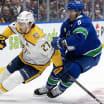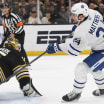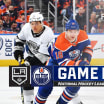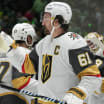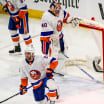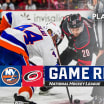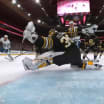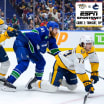It was more the absence of an individual than the presence of three others that made hockey's big news on this night 43 years ago.
The Hockey Hall of Fame grew by three players, a builder and an on-ice official on Aug. 23, 1973. Being inducted were defenseman Doug Harvey, goaltender Chuck Rayner and, posthumously, early-era forward Tommy Smith, as well as NHL and Hall of Fame pioneer Sen. Hartland de Montarville Molson, who also was a former co-owner of the Montreal Canadiens, and referee Frank Udvari.
HHOF referee at center of 'Richard Riot' remembered
Frank Udvari inducted into Hall on Aug. 23, 1973, more than 18 years after ejecting Canadiens' Maurice Richard
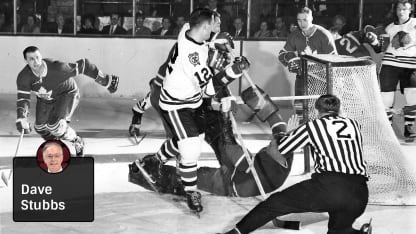
Harvey grabbed the headlines when he boycotted the Toronto ceremony, the former member of the Canadiens, New York Rangers, Detroit Red Wings and St. Louis Blues angry that he wasn't inducted the year before alongside Gordie Howe and former teammates Jean Beliveau and Bernie Geoffrion.
Still, the dinner at the Hall of Fame on the grounds of Toronto's Canadian National Exhibition was a fine affair, the five inductees celebrated for their excellence and the influential roles they played in the game.
Of all the games Udvari worked in a 15-year NHL career, none was more famous than the Canadiens-Boston Bruins game at Boston Garden on March 13, 1955, a violent fracas that night paving the way for the infamous "Richard Riot" in Montreal on March 17.
But that drama was in the shadows in 1973 when Udvari and four others were inducted into the Hall of Fame.
Udvari had toiled through the NHL's sometimes tumultuous 1950s and '60s, an ironman in stripes who missed two games, each because of family illness, over a decade and a half.
He had come to officiating quite by accident, having arrived in Kitchener, Ontario, at age 7 with his family from their native Czechoslovakia.
A juvenile league coach in Kitchener in the 1940s, Udvari was pressed into service when a referee failed to show for a game; after three seasons of calling action in the Ontario junior league, he was hired by Carl Voss, the NHL's referee-in-chief, to begin as a linesman.
Udvari had his share of run-ins with team management and players. Early on, he incurred the wrath of fire-breathing Red Wings forward Ted Lindsay, a former baseball teammate in Waterloo, Ontario.
"I'd heard a lot about Lindsay's treatment of referees, but when I got to the NHL I thought surely he wasn't gonna pull that kind of stuff on me. After all, we'd been on the same ball team," Udvari told author Dick Irvin Jr. (at left with Udvari in 1973 photo above) in the latter's 1997 book "Tough Calls."
"Sure enough, the first time I'm on the ice in Detroit (in the early 1950s), I give a penalty about 10 minutes into the game and here comes Lindsay. He called me everything under the sun, and finally I had to give him a game misconduct.
"In those days, coaches and general managers would come in and out of the referee's room like it was Grand Central Station. So after the first period, in comes (Detroit GM Jack) Adams putting on his act, saying, 'Well, my son, why did you throw Teddy out of the game?' I told him because he had called me a (expletive) this and a (expletive) that. Adams told me not to worry, that he'd make sure it never happened again. But of course, it did."
For his poise in the heat of action, Udvari was assigned by Voss to many of the NHL's toughest games between the League's fiercest rivals, powder-keg contests that were in constant danger of explosion.
"Guys in the game today have no idea how tough players were in those days, like Rocket Richard and Lindsay," Udvari told Irvin. "In the warmup, Lindsay would tell guys on the other team he was going to cut their (expletive) head off. I mean, he was mad already, and the game hadn't even started. The ferociousness and the way they focused on the game was unbelievable."
There were light moments -- sort of. Udvari recalled once giving the Red Wings five consecutive penalties and having the great Howe skate over to sneer at the No. 1 on his referee's back, saying that Udvari still was only second-best. Asked who was best, Mr. Hockey replied, "Everybody else is tied."
No game that Udvari worked would have a more dramatic fallout than the Canadiens' game against the Bruins in Boston on March 13, 1955.
Montreal's Maurice "Rocket" Richard was clipped and cut by the stick of Boston defensemen Hal Laycoe that night, touching off a melee that ended with Richard slugging linesman Cliff Thompson and being assessed a match penalty by Udvari.
NHL President Clarence Campbell suspended Richard for the Canadiens' final three regular-season game and the Stanley Cup Playoffs, and Rocket lost the League scoring title to Geoffrion by a point, 75-74.
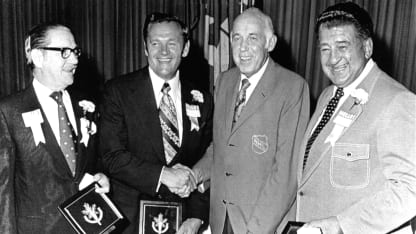
© B Bennett/Getty Images
Enraged fans rioted during and after the Canadiens' next game, March 17 at the Montreal Forum. It would be an event that changed not only hockey in the city, but the entire political landscape in Quebec, strengthening the resolve of French-Canadians in their cultural and linguistic battle against the English.
"But Rocket had a chance to score before it all happened," Udvari told Irvin of the moments before Laycoe's high stick had lit Richard's fuse. "He broke in on the right wing, Sugar Jim Henry was the goalie, and if I'm not mistaken, Richard let a backhand go that beat him but it hit the post. … If that goes in the net, I don't think there are any problems."
Udvari's last official game was the deciding match of the 1966 Stanley Cup Final between the Canadiens and Red Wings in Detroit. Henri Richard scored the Cup-clinching goal in overtime of Game 6, sliding toward goalie Roger Crozier to have the puck deflect off his torso or be directed into the Detroit net by his arm, depending on your point of view.
Twelve years later, as an officiating supervisor, Udvari returned to the ice in emergency relief of injured referee Dave Newell. The veteran finished the second and third period of the Dec. 30, 1978, game on Long Island between the New York Islanders and Atlanta Flames, wearing a pair of skates he had borrowed from Islanders forward Bryan Trottier.
In his gray dress trousers and a borrowed sweater, Udvari immediately noticed how much quicker the game had become from his days calling the action, and how hard the players shot the puck.
The Islanders won 4-2, but fittingly, the game wasn't without a moment of drama. Udvari disallowed a goal by -- who else? -- the Islanders icon whose skates he was wearing.
"But I survived," Udvari joked. "And those size 8 1/2 skates I borrowed from Bryan Trottier are now in the Hockey Hall of Fame."
Udvari's influence would be felt long after he had worked his final game, as he operated officiating schools to groom and promote some of the NHL's best referees and linesmen.
Sadly, none from the Hall's class of 1973 are with us any longer, Udvari the last to go, in 2014 at age 90.
But on Aug. 23, 1973, one of the NHL's greatest referees enjoyed a special moment in the spotlight, a change of pace for a man who knew he'd had a good night in hockey when he left the arena with his work having been invisible.

